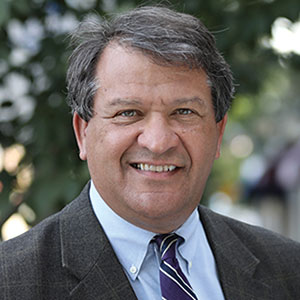Latimer to Declare COVID-19 State of Emergency for Westchester

Rising COVID-19 cases and hospitalizations will force Westchester County Executive George Latimer to declare a state of emergency this week in hopes of heading off more serious consequences related to the virus.
Latimer said Monday he intends to craft a formal declaration in the coming days but didn’t specify what steps might be taken as part of that effort. Emphasis on mask-wearing in public, vaccinations for those who have yet to be inoculated and encouraging booster shots for eligible residents will continue to be stressed.
“With that declaration comes no specific mandate or action at this point in time,” Latimer said. “However, this is the point in time that I have to ask each of you to understand that we are now crossing to a level of emergency, and that emergency requires each of us to determine what can we do on our own, voluntarily, freedom though it be, before we have to take government action on behalf of the whole society.”
Latimer said his administration will be sitting down in the coming days with leaders in business, health care and other sectors to come up with a plan that would be acceptable and gain consensus.
He stopped short of calling for mask and vaccine mandates, except for continuing mask-wearing in county-owned buildings and on mass transit, measures that have been in place for months.
Guidelines that trigger an emergency declaration are an infection rate of 3 percent, 100 COVID-19-related hospitalizations, 3,000 active cases and 10 deaths in a week, Latimer noted.
Statistics released by the state as of Dec. 4 revealed Westchester had a 3.3 percent positivity rate with 2,867 active cases, which now exceeds the August spike attributed to the Delta variant, and 84 hospitalizations, nearly triple from a month ago. Latimer said during his Monday briefing that updated numbers have pushed the active case total to more than 3,000.
The good news is that fatalities have remained extremely low, averaging one a week from COVID-19 during the past month. Over the past week, there was again one COVID death in Westchester.
While the numbers do not all have to meet or exceed the thresholds laid out, Latimer said he believes that hospitalizations may be the most critical in determining future course of action.
“If the hospital capacity of the county can handle and manage a level of serious illness – hospitalizations – then we are managing the disease as best we can,” he said.
In comparison, hospitalizations reached 567 during the mid-January peak early this year following the difficult second wave and just as the first doses of the vaccines were being rolled out. That wave crested about two weeks after the end of the holiday season after many people visited families and stayed indoors because of the arrival of winter.
The county’s nearly 93 percent vaccination rate has limited the spread of serious illness and deaths, Latimer said. He called vaccines “the single most effective tool” to reduce those numbers, although just 57 percent of the current 84 COVID hospitalizations are people who are unvaccinated. The other 43 percent also include those who are not fully vaccinated and an unannounced number of patients with underlying health conditions.
“We are in much better shape today than we were a year ago today, and when people are looking at this and they see and they hear about Omicron and they hear cases are rising, let’s put it in perspective where we are today,” said Latimer.
White Plains Hospital CEO Susan Fox said advances in handling COVID-19 patients, along with the wide availability of the vaccine during the past year, have made treating the virus more effective.
While there was a high of 240 COVID hospitalizations in the early months of the pandemic at White Plains Hospital, Fox said there were just 15 on Monday, and only one of those is in the ICU. Last year, the hospital had to flex its ICU from a capacity of 15 beds to accommodate 86 patients.
Latimer warned residents, businesses and organizations to take the COVID threat seriously. He said he didn’t want to institute mandates but will do so if circumstances warrant them.
“We will use the power if the individuals amongst us are not having an effective result in dealing with this pandemic,” Latimer said.

Martin has more than 30 years experience covering local news in Westchester and Putnam counties, including a frequent focus on zoning and planning issues. He has been editor-in-chief of The Examiner since its inception in 2007. Read more from Martin’s editor-author bio here. Read Martin’s archived work here: https://www.theexaminernews.com/author/martin-wilbur2007/
